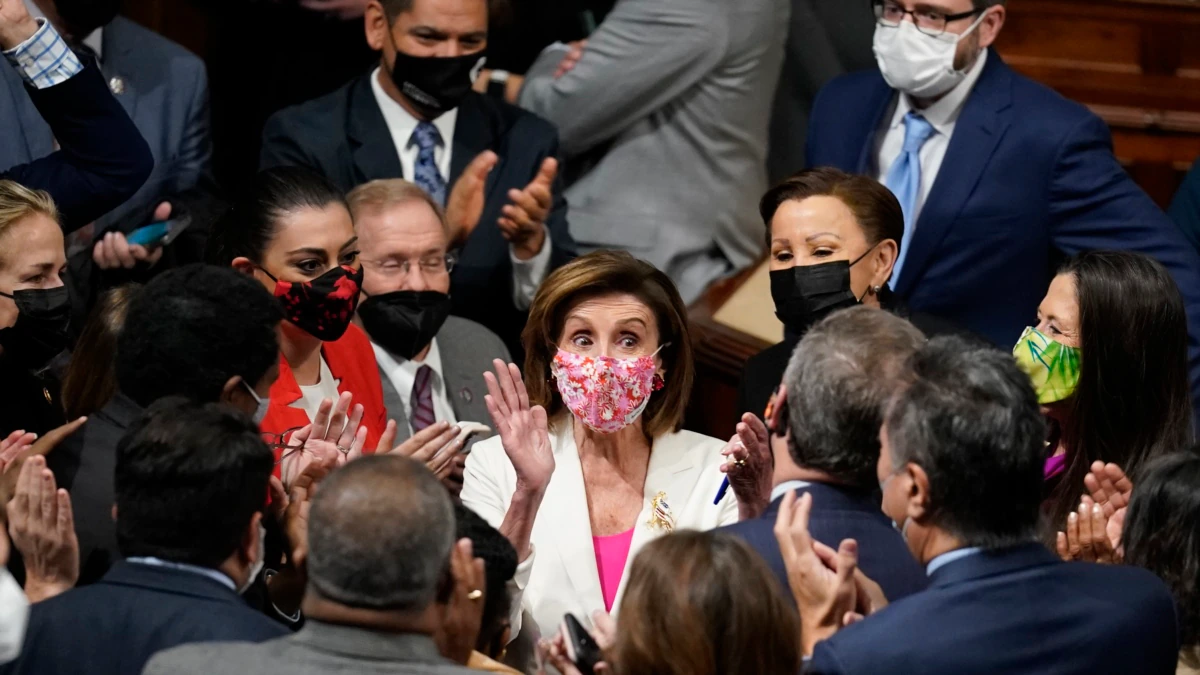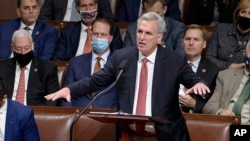President Joe Biden’s signature Build Back Better package of climate and social spending passed the House of Representatives on Friday morning, 220-213, less than 24 hours after the Congressional Budget Office (CBO) produced an analysis of the legislation finding that it would add a relatively modest $160 billion to the federal debt over the next 10 years.
The bill, which still must pass the narrowly divided Senate, dedicates more than half a trillion dollars to spending on measures to combat climate change, provides funding for universal pre-school, expands access to healthcare, and provides tax credits to families with children, among other things.
The rapid passage of the bill after the CBO announced the verdict on its costs underlines the importance of that agency to the legislative process in Washington, as well as lawmakers’ willingness to be flexible about how they read the agency’s analyses.
A significant number of Democrats who represent contested districts – enough to scuttle the bill if they had voted against it – had been concerned about the political impact of Republican claims that the bill would greatly expand the federal debt. Last week, these mostly moderate Democrats told Democratic House Speaker Nancy Pelosi that they would not vote for the bill without a CBO analysis that showed it was fully paid for.
Detailed ‘budget score’
The CBO is a non-partisan federal agency within the legislative branch created in 1974 that is considered by many economists the gold standard for analyzing the budgetary impact of proposed legislation and its long-term impact on the federal debt.
On Thursday afternoon, the CBO began releasing its analysis of the bill, known as a “budget score.” It found that the combination of spending and tax breaks contained in the package add up to $2.4 trillion and that elements that would raise revenue or reduce spending add up to $2.27 trillion.
One element of the CBO report caused some confusion because of the way the numbers were presented. The official release said that the bill would result in a $367 billion increase in the debt over 10 years, because it did not account for the revenue effects of the increased IRS enforcement. In a different statement, the agency estimated $207 billion of increased revenue related to IRS enforcement, leaving the ultimate budget deficit increase at $160 billion over a decade.
A flexible reading of the CBO
In a political climate where Democrats and Republicans generally distrust each other, the CBO is still seen as above the fray, delivering non-partisan analysis. The agency’s judgment that the addition to the debt would average out to just $16 billion per year meant that the legislation does not officially pay for itself.
That’s where the flexibility in reading CBO analysis kicked in.
A key element of the bill is an $80 billion increase in funding for the Internal Revenue Service to enforce the nation’s tax laws. The White House and a number of outside groups, including a bipartisan coalition of former IRS commissioners, had projected that the investment would return $400 billion in increased tax revenue over a decade. But CBO only estimated a $207 billion return.
“CBO is notoriously cautious about predicting revenue increases from IRS enforcement,” said William A. Galston, a senior fellow in the Brookings Institution’s Governance Studies program.
“Estimating revenues from enforcement is an art not a science,” Galston said. “Bottom line, nobody knows for sure.”
It was that uncertainty, and the generally accepted understanding that CBO is very cautious about estimating tax revenue, that gave all but one of the moderate Democrats the wiggle room they needed to throw their support behind the bill.
“They took the position, after the CBO score came out, that it was good enough,” said Galston. “It enabled them to make a good faith claim that the bill was completely paid for.”
Republicans disagree
Not surprisingly, Republicans in the House chose to take a much more literal reading of the CBO’s analysis, and slammed the Democrats for passing a bill that will add to the national debt.
“This is the single most reckless and irresponsible spending in the history of this country,” House Republican Leader Kevin McCarthy declared.
McCarthy’s comment came during a marathon speech that stretched for more than eight hours, ending shortly before 6 a.m. on Friday. The overnight monologue took advantage of a loophole in House rules that allows the leader of either of the parties to take unlimited floor time, and forced Democrats to delay a vote they had hoped to take on Thursday.
CBO’s sway in the Senate unclear
The CBO score may have been enough to convince moderate Democrats in the House of Representatives to vote in favor of the bill, but the problems it faces in the Senate go deeper than the legislation’s effect on the federal deficit.
The Democrats have only 50 votes in the 100-seat Senate, and must rely on Vice President Kamala Harris to cast a vote in the event of a tie. That means Democrats cannot afford to lose any votes on the bill.
The most prominent member of the party likely to break from the pack is West Virginia Senator Joe Manchin, who has been publicly skeptical of specific parts of the bill, and has been more generally concerned that an increase in government spending will lead to further increases in inflation.
Manchin’s constituents tend to be older and more likely than most Americans to be on a fixed income. That makes them especially vulnerable to price inflation, which was recently measured at an annual rate of 6.2%, the highest in more than 30 years.

















































